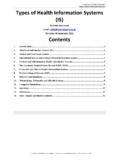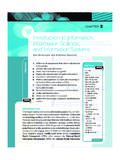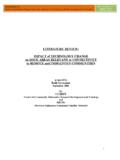Transcription of A Code of Ethics for Health Informatics Professionals
1 The IMIA Code of Ethics for Health Information Professionals Preamble Codes of professional Ethics serve several purposes: 1. to provide ethical guidance for the Professionals themselves, 2. to furnish a set of principles against which the conduct of the Professionals may be measured, and 3. to provide the public with a clear statement of the ethical considerations that should shape the behaviour of the Professionals themselves. A Code of Ethics for Health Informatics Professionals (HIPs) should therefore be clear, unambiguous, and easily applied in practice.
2 Moreover, since the field of Informatics is in a state of constant flux, it should be flexible so as to accommodate ongoing changes without sacrificing the applicability of its basic principles. It is therefore inappropriate for a Code of Ethics for HIPs to deal with the specifics of every possible situation that might arise. That would make the Code too unwieldy, too rigid, and too dependent on the current state of Informatics . Instead, such a Code should focus on the ethical position of the Health Informatics specialist as a professional , and on the relationships between HIPs and the various parties with whom they interact in a professional capacity.
3 These various parties include (but are not limited to) patients, Health care Professionals , administrative personnel, Health care institutions as well as insurance companies and governmental agencies, etc. The reason for constructing a code of Ethics for HIPs instead of merely adopting one of the codes that have been promulgated by the various general associations of Informatics Professionals is that HIPs play a unique role in the planning and delivery of Health care: a role that is distinct from the role of other Informatics Professionals who work in different settings.
4 Part of this uniqueness is centred in the special relationship between the electronic Health record (EHR) and the subject of that record. The EHR not only reveals much about the patient that is private and should be kept confidential but, more importantly, it functions as the basis of decisions that have a profound impact on the welfare of the patient. The patient is in a vulnerable position, and any decision regarding the patient and the EHR must acknowledge the fundamental necessity of striking an appropriate balance between ethically justified ends and otherwise appropriate means.
5 Further, the data that are contained in the EHR also provide the raw materials for decision-making by Health care institutions, governments and other agencies without which a system of Health care delivery simply could not function. The HIP, therefore, by facilitating the construction, maintenance, storage, access, use and manipulation of EHRs, plays a role that is distinct from that of other Informatics specialists. At the same time, precisely because of this facilitating role, HIPs are embedded in a web of relationships that are subject to unique ethical constraints.
6 Thus, over and above the ethical constraints that arise from the relationship between the electronic record and the patient, the ethical conduct of HIPs is also subject to considerations that arise out of the HIPs 2interactions with Health Care Professionals (HCPs), Health care institutions and other agencies. These constraints pull in different directions. It is therefore important that HIPs have some idea of how to resolve these issues in an appropriate fashion. A Code of Ethics for HIPs provides a tool in this regard, and may be of use in effecting a resolution when conflicting roles and constraints collide.
7 A Code of Ethics for HIPs is also distinct from an account of legally conferred duties and rights. Unquestionably, the law provides the regulatory setting in which HIPs carry out their activities. However, ethical conduct frequently goes beyond what the law requires. The reason is that legal regulations have purely juridical significance and represent, as it were, a minimum standard as envisioned by legislators, juries and judges. However, these standards are formulated on the basis of circumstances as they obtain here and now; they are not anticipatory in nature and therefore can provide little guidance for a rapidly evolving discipline in which new types of situations constantly arise.
8 HIPs who only followed the law, and who only adjusted their conduct to legal precedent, would be ill equipped to deal with situations that were not envisioned by the lawmakers and would be subject to the vagaries of the next judicial process. On the other hand, a Code of Ethics for HIPs is grounded in fundamental ethical principles as these apply to the types of situations that characterize the activities of the Health Informatics specialist. Consequently such a Code, centring in the very essence of what it is to be an HIP, is independent of the vagaries of the judicial process and, rather than following it, may well guide it; and rather than becoming invalidated by changes in technology or administrative fashion, may well indicate the direction in which these developments should proceed.
9 Therefore, while in many cases the clauses of such a Code will be reflected in corresponding juridical injunctions or administrative provisions, they provide guidance through times of legal or administrative uncertainty and in areas where corresponding laws or administrative provisions do not exist. At a more general level, such a Code may even assist in the resolution of the problems posed by the technological imperative. Not everything that can be done should be done. A Code of Ethics assists in defining the ethical landscape.
10 The Code of Ethics that follows was developed on the basis of these considerations. It has two parts: 1. introduction This part begins with a set of fundamental ethical principles that have found general international acceptance. Next is a brief list of general principles of informatic Ethics that follow from these fundamental ethical principles when these are applied to the electronic gathering, processing, storing, communicating, using, manipulating and accessing of Health information in general. These general principles of informatic Ethics are high-level principles and provide general guidance.








